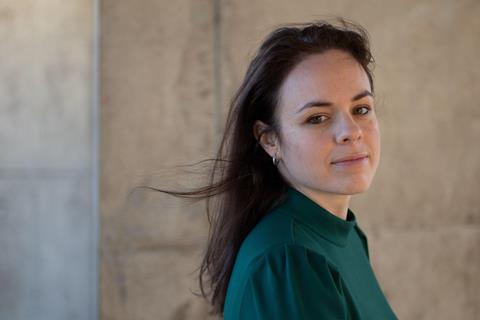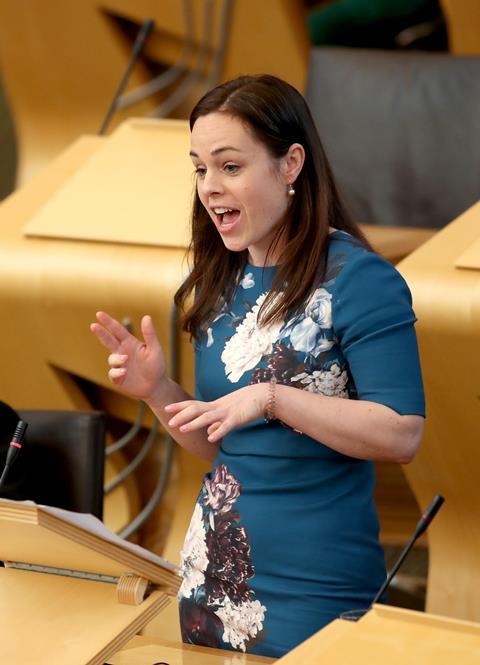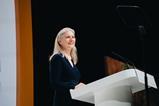Previously leader of the Liberal Democrats and currently the Liberal Democrat MP for Westmorland and Lonsdale, Tim Farron is host of the ‘A Mucky Business’ podcast, which delves into politics through the eyes of Christians. He recently interviewed Kate Forbes, MSP for Skye, Lochaber and Badenoch, who narrowly missed out on her SNP leadership bid to Hamza Yusuf earlier this year. Having experienced a similar backlash, Tim recognises her defeat as an attack on her Christian faith, which dominated the headlines during the leadership campaign. She shares how she dealt with that storm and comments on whether there is now an impassable ceiling for Christians in politics

Tim Farron [TF]: Let’s start with your bid to become the First Minister of Scotland. From the outset of that campaign, you were absolutely clear about your faith; what it meant. It seems to me, as someone who’s been in a similar position, that you would have thought and prayed about how to talk about those kinds of things in advance – certainly more than I did, I reckon. So how much had you prepared for it?
Kate Forbes [KF]: I certainly think I prepared for those questions, but I had been on maternity leave for six or seven months. So, my primary source of information and polling over the last six months had not been political in nature. It had been mother and toddler groups. My preparation had been engaging with ordinary citizens, many of whom did not share my faith. And perhaps it gave me a perspective, that actually people are crying out for honesty, truthfulness, integrity from their politicians. I went from that straight into the fiery furnace over the leadership contest. I knew that the first questions that I would be asked would be about my faith. It was the most interesting part about me, perhaps, and others scented blood; they knew that it was my ‘weakness’. I had a choice to just tell the truth, or to prevaricate, try and dress it up, making it sound more palatable. But I also knew that, inevitably, they would keep asking until they got what they were looking for. I thought that, on day one, I was as well to answer, then try and barricade for another few days.
TF: It certainly struck me as being the wise thing to do. You didn’t equivocate about your faith. I think at times, by the way, when I was in a similar position, I did, to my shame. With you, though, I think opponents had a kind of ‘gotcha’ moment. Do you think that because you were really honest right from the beginning, that perhaps had an impact on allowing the debate with your rivals?
KF: Well, in the first few days, I think there were probably still quite a few who thought that I did get gut-check questions. Of course, there were issues around marriage, children – it went quite broad quite quickly. It was still several days of some difficult questions that didn’t allow for much nuance – as you know, politics is binary. You’re either pro or against. That first week was touch and go as to whether I would be given the chance to start talking about the economy, about social issues that weren’t just those hot moral issues. I think what amazed people is that I kept going. I think most people thought: “That’s it over and done; she’s out.” And I said: “No, I’m not. I’m still here.” At the beginning of the following week I went quite hard on some of the economic issues, and moved the debate onto that territory. Looking back, it could have gone either way in that first week. And even at the beginning of the following week, the journalists still wanted to talk about the moral matters, because, clearly, that’s the most interesting part. It took quite a lot of effort to push on to other issues.
TF: In that first week or so, when that was all you were being asked about, you didn’t come across like a rabbit in the headlights but you may have felt under extreme personal pressure. What was the campaign like for you personally, and for your family?
KF: I don’t think there’s any two ways about it; when you’re in the eye of the storm there are – to mix my metaphors – ripple effects. I have stepdaughters who had to go into school, I have a husband who has a job that has him meeting a lot of clients and customers on a daily basis. I was particularly worried about the reception that they might get, because, you know, school pupils are not always the most forgiving, but we experienced such a backlash to the backlash. I went into Tesco on the Friday night, quite concerned about what I would get from other shoppers. We could barely get to the checkout because of the number of people that stopped us to say: “We just want to let you know that we’re right behind you.” The same happened on the Saturday when I went to a local football game. I had this sense that even though I was perhaps not particularly well liked in the public domain, my local people were right behind me. And my family experienced that as well.

TF: How have you found the Christian community across Scotland and beyond? How have they responded?
KF: Since the beginning of my political career, I’ve often felt there is a tension between what the Christian community may expect of me or hope to see me do, and my duties and responsibilities as a representative of everyone. What was really interesting during the leadership contest is I think those fraught fault lines disappeared. There was so much uniting of Christians and people without faith along principles like freedom of speech, freedom of political view, freedom of conscience. These are principles that unite Christians and those without faith. There was a small minority of people – with faith and without faith – who were also united in thinking that I had done irreparable damage to my witness. Ultimately, I’m conscious that I’ll have to give an account for what I see and do. That is the nature of faith, whether it’s lived out publicly or privately.
People are crying out for honesty, truthfulness, integrity fromtheir politicians
TF: Let’s go back to the hustings. I noticed you took a couple of fairly clear swipes at your main rival over his track record in previous cabinet positions. So how do you respond to the accusation that Christians should be nicer than that?
KF: Well, you could also argue that Christians should never go into any competition for fear they might win over somebody else. Let’s be clear about the nature of the job, the nature of contests and competitions, and also the extremely important rule of leading a nation and the need to be competent, the need to have a clear vision, the clear need to have principles. Any debate that I took part in was very much querying my opponents along those lines, and I don’t think my opposition held back.
TF: As we look at the result, there may be some people, who observed that cursive ratio of 50 to 48 that you missed out by, and thought: “If only she kept her mouth shut, she’d have won.” Is there any truth in that?
KF: Hypotheticals are notoriously difficult to answer. Because would I have had as much public interest had I kept my mouth shut? Maybe I would have won, but would then have fallen quite quickly because of these issues emerging.
TF: How would you advise a Christian entering into politics now to approach their ambition in the light of your experience?
KF: Firstly, I think they need to be very honest with themselves, and with all the many parts of the infrastructure of politics. From the very beginning, I think it is very risky to hide their faith. Too often people think: “If I keep quiet at the beginning, then I’ll get into position of responsibility and I’ll be able to change everything.” But if you don’t learn how to explain yourself, and defend yourself in some of the small spheres, then it’s almost impossible in the bigger sphere. My second point is: don’t be fearful. If you want to be in politics, go for it. I know some people who never want to do any media, never want to have any conversations, won’t go near politics, because of their fear. But do not let fear characterise everything you do.
TF: Some will say that your experience shows that Christians face a kind of impossible ceiling in politics. Do you think they’ve got a point?
KF: No. People said to me that it was impossible to be an elected representative and a Christian. But that’s not true. Then they said it was impossible to be in a senior position of influence, and be a Christian. But that wasn’t true. And then they said it was impossible to be leader and a Christian. And I would suggest that the backlash to the backlash, and the public cries for truth, integrity and reality means that they’re actually crying out for more, rather than less, honesty.
Listen to the interview in full on the
‘A Mucky Business’ podcast, available now on Premier Plus at premier.plus/podcasts.






























No comments yet